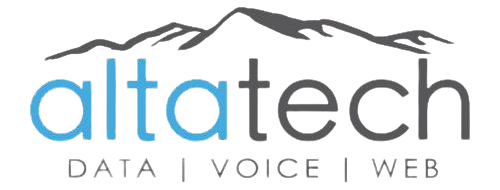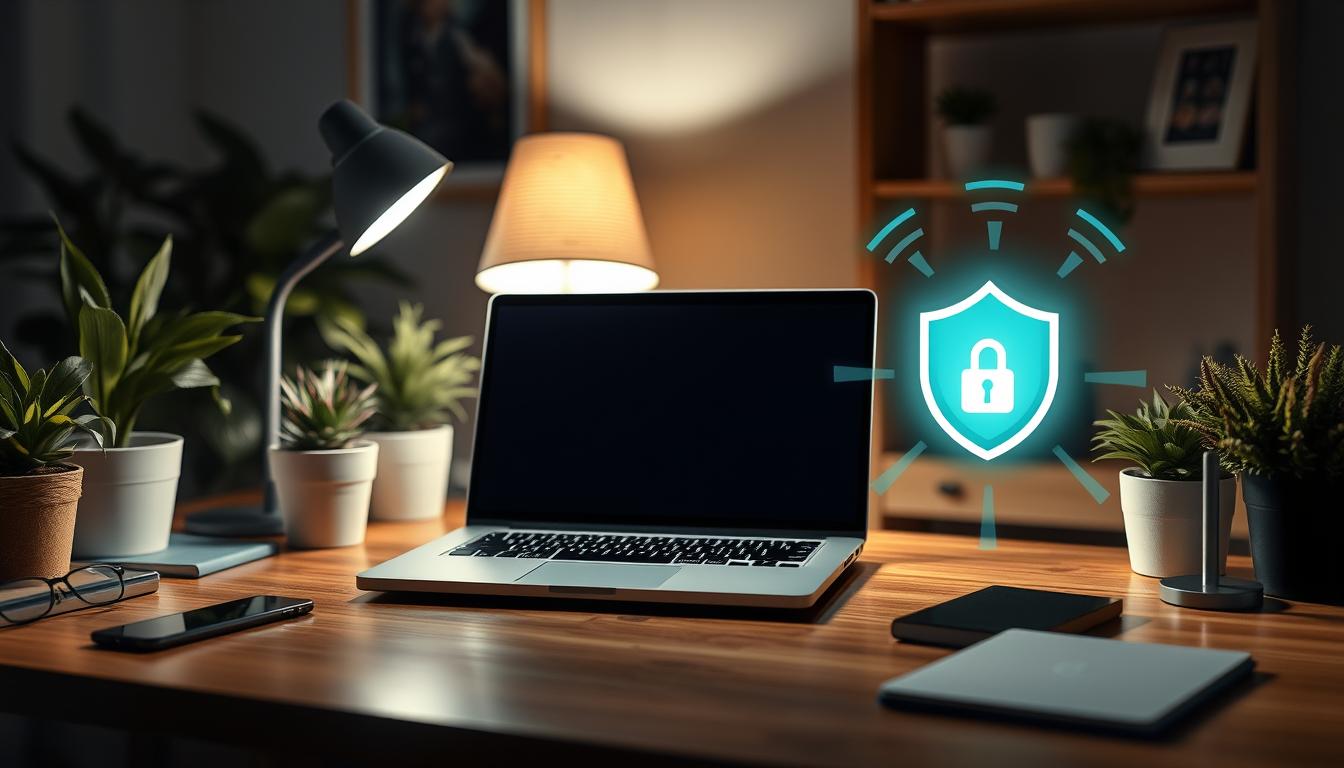The way we work has changed a lot, with more people working from home. This shift means we need strong cybersecurity strategies. It’s crucial to keep our work safe from cyber threats when we’re not in an office.
We will show you six key ways to protect your remote workspace these steps are not just suggestions they are essential tools to keep your digital office safe. By following these tips, you’ll be better protected against cyber attacks.
A cozy home office setup with a sleek laptop on a wooden desk, surrounded by plants and personal items, a secure lock symbol visible on the screen, a soft glow of a lamp, wireless router in the background emitting signals, and a digital shield icon subtly integrated into the decor, conveying a sense of security in remote work.
Implement Strong Password Policies
As more people work from home, keeping data safe is more important than ever. Strong passwords are the first line of defense against hackers. They protect not just one account but the whole network.
Creating Complex Password Combinations
Complex passwords are key to fighting off cyber threats they mix letters, numbers, and symbols this makes it hard for hackers to guess them. It’s crucial for companies to teach their teams about this and enforce strict password rules.
Using Password Managers to Enhance Security
Password managers are a top choice for keeping passwords safe. They store all your login details in one place. This makes logging in easier and keeps your data secure.
Regularly Updating and Changing Passwords
Changing passwords often is a smart move. It keeps your data safe from hackers who might have your old password. Regular changes are a key part of good password management.
Utilize Multi-Factor Authentication (MFA)
Multi-Factor Authentication (MFA) is a top layer that makes it hard for hackers to get in. This part explains why using enhanced authentication methods like MFA is vital for keeping data and systems safe.
Understanding the Importance of MFA in Preventing Unauthorized Access
MFA makes sure even if one login detail is stolen, hackers can’t easily get into your account. It asks for more than just a password, making it a strong defense against new threats. Using MFA implementation strategies greatly lowers the chance of data leaks, making your security stronger.
Different Types of MFA and How to Use Them
MFA can be something you know, have, or are. Businesses need to pick MFA tools that fit their security needs. For example, biometric verification like fingerprints is very secure because it’s unique to each person. But, SMS codes are less secure and should be used with other methods for better multi-tiered security approach.
Update and Maintain Security Software
Keeping your remote work safe is key you need the latest antivirus software, regular security patches, and automated updates. These tools protect against many cyber threats, like malware and phishing.
Having the latest antivirus software is crucial. It guards against new viruses and threats that pop up every day. This way, remote workers can keep their systems safe from security breaches that could leak sensitive info.
Regular security patches are also vital for staying safe online. These patches fix holes that hackers could use. By applying them quickly, you keep your systems secure and prevent attacks.
Automated software updates are also important. They keep your security up to date without needing you to do anything. This is especially helpful for remote workers, where IT support might not be nearby.
In short, to fight cyber threats, use the latest antivirus software, apply security patches often, and set up automated updates. These steps protect your devices from today’s and tomorrow’s threats. They keep your personal and company data safe.
Establish Secure Connections with VPNs
Remote workers often use public networks to access their company’s systems. This can be risky. Using a VPN is key to keeping their data safe. VPNs create a secure tunnel for data, hiding it from hackers.
How VPNs Protect Data Transmission Over Public Networks
VPNs are a must for remote workers to keep their data safe. They wrap internet traffic in a strong encryption layer. This makes it hard for hackers to get to the data, even if they get into the network.
VPNs turn data into unreadable code. This protects company secrets and keeps remote work safe.
Selecting a Reliable VPN Service Provider
Choosing a good VPN service is important. Remote workers need to look for strong security, lots of servers, fast connections, and strict privacy policies. The VPN should keep users safe with features like kill switches and zero-logging.
It’s important to pick a VPN that keeps its promises this way remote workers can work safely, no matter where they are.

